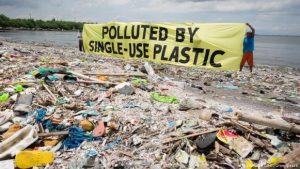The Association for Environmental Impact Assessment of Nigeria (AEIAN) has listed four conditions to end plastic pollution in the country.

Prof. Ijeoma Vincent-Akpu, AEIAN’s President, listed the conditions in an interview on Tuesday, June 6, 2023, in Lagos.
The association spoke against the backdrop of World Environment Day (WED) which the global community marked on June 5.
The theme of the 2023 WED was focused on Solutions to Plastic Pollution.
The professor said that research had shown that humans ingested about five grammes of plastic every week and five pounds of plastic in 10 years.
She noted that plastic pollution had grown tremendously over the years and could be found nearly everywhere.
“The UN says ‘the world is choking on plastic’ and National Geographic says ‘the world is drowning in plastic’.
“If no action is taken, plastic production is set to grow to 29 million metric tonnes per year,” she said.
Vincent-Akpu said that AEIAN had outlined the following conditions to put an end to plastic pollution:
“There should be reduction in the growth of virgin plastic production, invest in recyclable plastic rather than single use plastics that are disposed off.
“Government, businesses and individuals should work together to promote circular economy model, through extended producer responsibility and product stewardship, encourage product redesign, reusable alternatives, and eco-friendly packaging practices.
“Policy interventions such as ban on single use plastic, levies, and incentives and improve waste collection infrastructure should be put in place.
“Collective efforts such as collaboration with organisations, neighboring countries, and the private sector, is vital for knowledge exchange, funding and capacity-building initiatives,” Vincent-Akpu said.
Similarly, Mr Babatunde Qodri, environmental and climate change campaigner, called for legislation to regulate the use of plastic trash by outlawing it or reducing the quantity produced.
Qodri made the appeal in an interview on Wednesday, June 7, 2023, in Ilorin, Kwara State, in commemoration of the 2023 World Environment Day.
He said that regulating the use of plastic had become imperative in view of new laws and other incentives which were needed to encourage or mandate the closure of the plastic waste loopholes.
Qodri, a coordinator for the climate change leadership training in Kwara, said plastic pollution is a plague that is now threatening the planet.
”A nation like Nigeria has struggled with waste management over the years and is also one of the most vulnerable to plastic garbage in Africa.
”The plastic is mostly left lying around on the road and in every street corner rather than being saved in trash cans and later recycled.
”And this disastrous attitude is attributable to ignorance and lack of regulation to deal with the threat, as a result, our earth and its components are seriously threatened.
”According to data, Nigeria produces over 2.5 million tonnes of plastic garbage annually; regrettably, more than 88 per cent of this waste ends up in landfills, water bodies and streets, which in the long run harm aquatic animals in the water,” the environmentalist said.
Qodri however noted that plastic waste, if managed effectively, could result in economic gain and could serve different purposes when recycled.
”Purposes such as lowering the need for new plastic production or using plastics to make use of significant environmental benefits which would therefore encourage the creation of jobs, landfill use and energy conservation.
”If properly addressed, and in a timely manner, this would have a long-term impact on the future of our world.
”Small efforts could have significant influence, and by working together, we can make real headway against the problem.
“We don’t need single-use plastic; instead, we need to reconsider how we buy, sell and shop in order to promote the circular economy,” he said.
By Fabian Ekeruche and Bushrah Yusuf-Badmus
